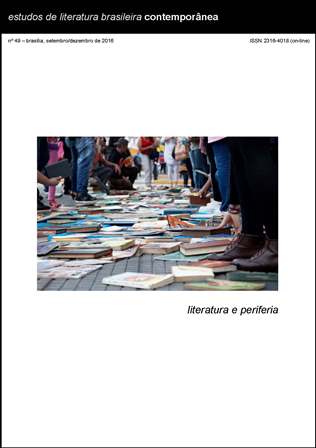Literatura e direitos humanos na obra de Sacolinha
DOI:
https://doi.org/10.1590/2316-4018495Abstract
Este artigo propõe examinar como textos de escritores da periferia urbana brasileira, especificamente a obra de Ademiro Alves, o Sacolinha, reivindicam os direitos humanos dos residentes da periferia, portanto de sua inclusão dentro da polis, através do nexo entre a representação da cotidianidade e da injustiça social na periferia urbana brasileira. Através da representação da injustiça social e do retrato da cotidianidade na periferia, que ocorrem de forma paralela nos textos aqui examinados, Sacolinha tanto aponta as condições socioeconômicas adversas em que vivem muitos residentes das periferias brasileiras, como valoriza a comunidade e a cultura da periferia. Seus textos sugerem que os moradores das periferias brasileiras não somente são vítimas de violações de direitos humanos, mas que também têm direito a ter direitos (Arendt, 1951).
Downloads
References
AGAMBEN, Giorgio (1998). Homo sacer. Tradução de Daniel Heller-Roazen. Stanford: Stanford University Press.
ANKER, Elizabeth S. (2013). Fictions of dignity: embodying human rights in world literature. Ithaca: Cornell University Press.
ALVARENGA, Darlan (2015). 71 mil brasileiros concentram 22% de toda riqueza; veja dados da Receita. G1, Rio de Janeiro, 1º ago. Disponível em: <http://goo.gl/th5jhy>. Acesso em: 3 ago. 2015.
ARENDT, Hannah (1951/1966). The origins of totalitarianism. New York: Harcourt, Brace & World.
BANCO MUNDIAL (2015). Prosperidad compartida y fin de la pobreza en América Latina y el Caribe. Washington. Disponível em: <https://goo.gl/PmBw0f>. Acesso em: 8 ago. 2015.
BELCHIOR, Douglas (2015). O genocídio da população negra pelo Estado brasileiro é denunciado em audiência da OEA em Washington, nos EUA. Carta Capital, 20 mar. Blog do Negro Belchior. On-line. Disponível em: <http://goo.gl/93oYCk> Acesso em: 4 ago. 2015.
DALCASTAGNÈ, Regina (2008). Vozes nas sombras: representação e legitimidade na narrativa contemporânea. In: DALCASTAGNÈ. Regina. Ver e imaginar o outro: alteridade, desigualdade, violência na literatura brasileira contemporânea. Vinhedo: Horizonte, p. 78-107.
ECKERT, Julia (2011). Introduction: subjects of citizenship. Citizenship Studies, Philadelphia, v. 15, n. 3-4, p. 309-317.
ESLAVA, Fernando V. (2004). Literatura marginal: o assalto ao poder da escrita. Estudos de Literatura Brasileira Contemporânea, Brasília, n. 24, jul./dez., p. 35-51.
FERRÉZ (2003). Manual prático do ódio. Rio de Janeiro: Objetiva.
FERRÉZ (2005). Capão pecado. Rio de Janeiro: Objetiva.
HOLSTON, James (2007). Citizenship in disjunctive democracies. TUCHIN, Joseph S.; RUTHENBURG, Meg. Citizenship in Latin America. Boulder: Lynne Rienner, p. 75-94.
HOLSTON, James (2008). Insurgent citizenship: disjunctions of democracy and modernity in Brazil. Princeton: Princeton University Press.
HOLSTON, James (2009). Dangerous spaces of citizenship: gang talk, rights talk and rule of law in Brazil. Planning Theory, Thousand Oaks, v. 8, n. 1, p. 12-31.
HOLSTON, James (2011). Contesting Privilege with right: the transformation of differentiated citizenship in Brazil. Citizenship Studies, Philadelphia, v. 15, n. 3-4, p. 336-352.
HUNT, Lynn (2007). Inventing human rights: a history. New York: W.W. Norton & Company.
IPEA ”“ INSTITUTO DE PESQUISA ECONÔMICA APLICADA (2013). Duas décadas de desigualdade e pobreza no Brasil medidas pela PNAD/IBGE. Brasília. (Comunicados do Ipea, n. 159). Disponível em: <http://goo.gl/0XXviK>. Acesso em: 8 ago. 2015.
NAÇÕES UNIDAS (1948). Declaração Universal dos Direitos Humanos. Paris, 10 dez.
NASCIMENTO, Erica Peçanha do (2009). Vozes marginais na literatura. Rio de Janeiro: Aeroplano.
PERLMAN, Janice (2008). Redemocratization viewed from below: urban poverty and politics in Rio de Janeiro, 1968-2005. In: KINGSTONE, Peter; POWER, Timothy J. (Ed.). Democratic Brazil revisited. Pittsburgh: University of Pittsburgh Press, p. 257-280.
PETROBRAS (2012). Apresentação. In: SACOLINHA. Como a água do rio. Rio de Janeiro: Aeroplano.
PIVETTA, Rejane (2011). Literatura marginal: questionamentos à teoria literária. Ipotesi, Juiz de Fora, v. 15, n. 2, p. 31-39, jul./dez.
SACOLINHA (2005). Graduado em marginalidade. São Paulo: Scortecci.
SACOLINHA (2012). Como a água do rio. Rio de Janeiro: Aeroplano.
SCHAFFER, Kay; SMITH, Sidonie (2004). Human rights and narrated lives: the ethics of recognition. New York: Palgrave Macmillan.
SLAUGHTER, Joseph R. (2007). Human rights, Inc: the world novel, narrative form, and international law. New York: Fordham University Press.
TENNINA, Lucía (2013). Saraus das periferias de São Paulo: poesia entre tragos, silêncios e aplausos. Estudos de Literatura Brasileira Contemporânea, Brasília, n. 42, p. 11-28.
Downloads
Published
How to Cite
Issue
Section
License
Authors who publish in this journal agree to the following terms:
a) The authors maintain the copyright and grant the journal the right of first publication, the work being simultaneously licensed under the Creative Commons Attribution License-Non Commercial 4.0 which allows the sharing of the work with acknowledgment of the authorship of the work and publication this journal.
b) Authors are authorized to enter into additional contracts separately, for non-exclusive distribution of the version of the work published in this journal (eg publish in institutional repository or as a book chapter), with authorship recognition and publication in this journal.
c) Authors are allowed and encouraged to publish and distribute their work online (eg in institutional repositories or on their personal page) after the editorial process, as this can generate productive changes, as well as increase the impact and citation of published work (See The Effect of Free Access).
d) The authors of the approved works authorize the magazine to, after publication, transfer its content for reproduction in content crawlers, virtual libraries and the like.
e) The authors assume that the texts submitted to the publication are of their original creation, being fully responsible for their content in the event of possible opposition by third parties.


